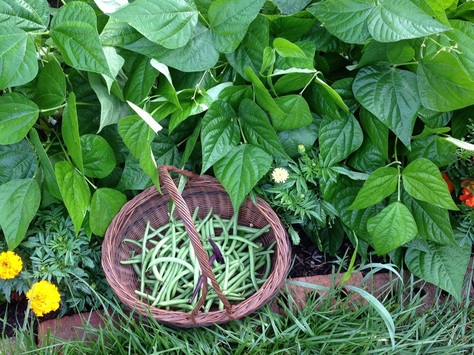I harvested early in the morning, before the sun was on the garden, so it was very pleasant. But bending down to harvest the beans (which took about ten minutes) was very unpleasant -- my back was killing me and I had to straighten out every few minutes.
It's at times like this that I come as close as I ever will to the life of a farmworker, which is to say not very close at all. But it just reminds me of the bane of their existence, the short-handled hoe, which required bending over like I was for a few minutes, for the entire day of 8, 10 or 12 hours. I believe contracts the United Farm Workers Union won got rid of that particular implement of torture.
And of course having the option of not working under the hot sun is an option that those who do this for a living do not have. And they work in climates that are hotter for more of the year, like southern California or Florida. I'm sure I couldn't take it for more than a half hour before I would faint away and die.
I'm reading The Warmth of Other Suns, a compelling book by Isabel Wilkerson about the Great Migration of African Americans from the South to the rest of the country covering a period of 1910 to 1970. She says in the introduction that she interviewed a phenomenal-sounding 1,200 people for the book, then focused in on three who left from different places in different decades and ended up in different parts of the country. She recounts the quotidian details of their lives, and for the woman among the three, Ida Mae Brandon Gladney, that meant following her to the cotton fields as she and her husband picked cotton for a landowner in conditions that seemed little different from slavery -- except they could leave, which they did. Imagine dragging around a hundred-pound sack of cotton in 100 degree heat with almost 100-percent humidity.
Which is all to say -- be grateful for the food on your plate and the t-shirt on your back, because a lot of folks suffered mightily to bring them to you. And support groups like the Coalition of Imokolee Workers, who pick tomatoes in South Florida and have organized to get a penny a pound more from behemoths like Taco Bell, McDonalds, Burger King and others, but are still fighting holdouts like Wendy's and Kroger.

 RSS Feed
RSS Feed
